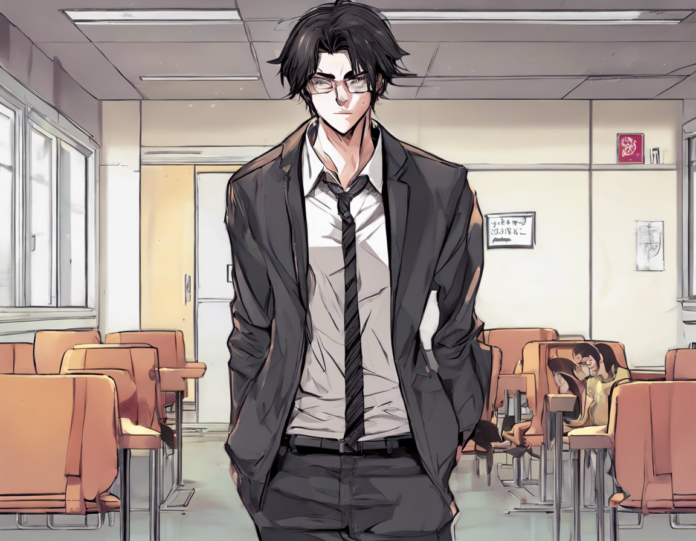High school can be a tough time for many young adults. It’s a period in our lives where we are trying to figure out who we are, what we want to become, and how we fit into the world around us. For some, high school can leave behind lasting scars that shape the way they view themselves and others. Bullying is a prevalent issue in many high schools, and its effects can be long-lasting.
In the world of manhwa—a type of Korean comic or graphic novel—stories about high school life often delve into the complexities of teenage relationships, friendships, and the challenges that young people face. One common theme that emerges in many manhwa series is bullying. These stories often portray the harsh realities of teenage life, including the pain and trauma that can result from being bullied.
One particular manhwa that has gained popularity for its exploration of this theme is “Confronting My High School Bully.” This series follows the story of a young protagonist who, after years of suffering in silence, decides to face their past head-on and confront the bully who made their life a living nightmare. Through this journey of self-discovery and healing, the protagonist learns valuable lessons about forgiveness, self-empowerment, and the importance of standing up for oneself.
Understanding the Effects of Bullying
Bullying is a serious issue that can have profound effects on a person’s mental and emotional well-being. Victims of bullying may experience a range of negative consequences, including low self-esteem, anxiety, depression, and even post-traumatic stress disorder (PTSD). The impact of bullying can last well into adulthood and affect various aspects of a person’s life, from relationships to career aspirations.
In “Confronting My High School Bully,” the protagonist grapples with these lasting effects of bullying as they navigate their journey towards confronting their tormentor. The series portrays the protagonist’s struggles with self-doubt and fear, as well as their gradual growth and transformation as they find the courage to stand up for themselves.
Themes of Forgiveness and Redemption
Central to the narrative of “Confronting My High School Bully” are themes of forgiveness and redemption. As the protagonist confronts their bully, they are forced to confront their own feelings of anger, resentment, and pain. Through this process, the protagonist learns the power of forgiveness and the importance of letting go of past hurts in order to move forward.
The series also explores the bully’s perspective, delving into their own motivations and struggles. Through this nuanced portrayal, “Confronting My High School Bully” highlights the complexity of human relationships and the potential for growth and understanding, even in the face of trauma and conflict.
Empowerment and Self-Discovery
At its core, “Confronting My High School Bully” is a story of empowerment and self-discovery. The protagonist’s journey towards confronting their bully is not just about seeking revenge or closure; it’s about reclaiming their own agency and sense of self-worth. Through this process, the protagonist learns to assert themselves, set boundaries, and prioritize their own well-being.
The series emphasizes the importance of self-care and self-compassion, reminding readers that healing from bullying is a gradual and ongoing process. By taking control of their narrative and facing their fears, the protagonist ultimately achieves a sense of catharsis and personal growth.
Closing Thoughts
“Confronting My High School Bully” offers a poignant and powerful exploration of the lasting impact of bullying and the potential for healing and transformation. Through its compelling narrative and nuanced character development, the series sheds light on the complexities of human relationships and the resilience of the human spirit.
As readers journey alongside the protagonist in their quest for resolution, they are reminded of the importance of empathy, understanding, and self-empowerment. “Confronting My High School Bully” serves as a testament to the power of forgiveness, redemption, and the enduring strength of the human heart.
Frequently Asked Questions (FAQs)
1. What is the definition of bullying?
Bullying is a form of aggressive behavior that is intentional, repetitive, and involves an imbalance of power. It can take various forms, including verbal, physical, social, and cyberbullying.
2. How common is bullying in high schools?
Bullying is unfortunately prevalent in many high schools, with studies indicating that a significant percentage of students experience bullying at some point during their academic career.
3. What are some of the signs that a student may be experiencing bullying?
Signs of bullying in students can include changes in behavior, sudden reluctance to attend school, unexplained injuries, loss of personal belongings, and a decline in academic performance.
4. How can parents and educators support students who are being bullied?
Parents and educators can support students who are being bullied by listening to their concerns, validating their feelings, helping them develop coping strategies, and working with school administrators to address the issue.
5. What are some effective ways to combat bullying in schools?
Effective strategies to combat bullying in schools include implementing clear anti-bullying policies, promoting a culture of respect and empathy, providing education on conflict resolution and bystander intervention, and fostering open communication between students and adults.
6. Is it ever advisable to confront a bully?
Confronting a bully can be a complex decision that depends on various factors, including the safety of the victim and the potential outcomes of such a confrontation. It is important to prioritize the well-being and safety of the victim in any course of action.
7. How can individuals cope with the long-term effects of bullying?
Individuals who have experienced bullying can cope with its long-term effects by seeking support from mental health professionals, engaging in self-care practices, developing strong support networks, and practicing self-compassion and forgiveness.
8. Can storytelling, such as in “Confronting My High School Bully,” help raise awareness about bullying?
Storytelling, whether through manhwa, literature, film, or other mediums, can be a powerful tool for raising awareness about bullying and its impact. By sharing personal narratives and exploring complex issues through storytelling, creators can foster empathy, understanding, and dialogue on the subject.
9. How can schools create a safer and more inclusive environment to prevent bullying?
Schools can create a safer and more inclusive environment to prevent bullying by implementing comprehensive anti-bullying programs, promoting diversity and inclusion, teaching social-emotional skills, encouraging positive bystander intervention, and fostering a culture of empathy and respect.
10. What resources are available for individuals who have experienced bullying and need support?
There are various resources available for individuals who have experienced bullying and need support, including hotlines, support groups, counseling services, online forums, and community organizations dedicated to bullying prevention and intervention.

